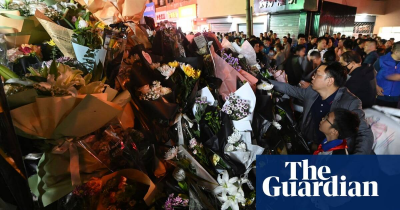The Guardian-China seeks to stifle public grief for former premier Li Keqiang
October 30, 2023 4 min 750 words
这篇报道揭示了中国政府对前总理李克强去世的公众哀悼严格控制,以避免可能导致社会动荡的大规模哀悼活动。尽管在李克强的家乡合肥市有数百名悼念者为他献花,社交媒体上也洋溢着对他的赞美,但在线讨论被严格审查,以确保李的遗产符合官方叙事,不提及政治或经济改革的话题。这种审查还包括删除提到李作为经济改革倡导者的评论。 这一措施反映了中国政府对高级官员或公众人物去世后的担忧,尤其是在一些敏感历史事件后,如1976年周恩来和1989年胡耀邦去世后引发的大规模哀悼和抗议活动。政府领导人害怕这些事件的回响。 有分析认为,李克强的去世成为一种表达对习近平政权不满的方式,因为他曾被视为经济自由化的倡导者,但后来被习近平逐渐边缘化,而习近平则强化了中共对经济的控制。这篇报道揭示了中国社会和政治动态的复杂性,以及言论自由受到限制的现实。这也强调了中国领导层对维护政治稳定的紧迫需求。
Public tributes to China’s former premier Li Keqiang, who died on Friday, are being strictly controlled as the government seeks to prevent a mass outpouring of grief that could lead to social unrest.
Li suffered a sudden heart attack in Shanghai and died in the early hours of Friday, according to Xinhua news agency.
There have been public displays of grief, particularly in his home city of Hefei, in Anhui province, where hundreds of mourners laid flowers for one of their most significant sons.
Social media is awash with tributes to Li, who was once seen as a force for economic liberalisation in the highest echelons of the Chinese Communist party (CCP). But discussion online has been strictly censored to ensure that Li’s legacy adheres to the official narrative and does not mention talking points about political or economic reform.
A leaked memo, published by China Digital Times, shows that media outlets have been instructed to “pay particular attention to overly effusive comments” regarding Li’s death.
Many of the comments that referenced Li’s reputation as an economic reformer were deleted. One comment that was censored from Weibo cited a Li quote from his first year as premier: “Whatever the market can handle, let the market do more of.”
Despite being China’s premier for a decade, it is not clear whether Li will receive an official memorial in addition to regular funeral arrangements. At the regular foreign ministry press briefing on Friday, spokesperson Mao Ning declined to elaborate on any plans.
Students, seen by CCP elites as the most volatile demographic when it comes to protests, are being instructed to refrain from pubic displays that go beyond the official lines. Screenshots circulating on social media show a message from the Youth League Committee at Hainan University instructing students to “at most” share Li’s official obituary. The notice said that any online or offline gatherings were “strictly prohibited”, according to a report in Taiwanese media.
Another notice posted to students at the Guiyang Institute of Aeronautics and Astronautics asked them not to make any comments about the “political situation” and to refrain from any public gatherings.
When Li became premier in 2013, he was seen as someone who would embrace private enterprise and allow the free market to flourish. But he was gradually sidelined by Xi Jinping, China’s leader, who has reasserted the CCP’s grip on all parts of the economy. To many, Li now represents the path not taken by China’s increasingly authoritarian government.
The CCP is particularly fearful about reaction to deaths of senior officials or public figures. The deaths of former premier Zhou Enlai in 1976 and Hu Yaobang, a former CCP general secretary, in 1989, prompted widespread outpourings of grief that morphed into protests.
More recently, the deaths of Covid whistleblower Li Wenliang in 2020 and people in an apartment fire in Xinjiang in 2022 triggered expressions of public grief – with the latter becoming the “white paper” protests that spread across several cities at the end of last year. The CCP leaders are “haunted” by these memories, said Jeffrey Wasserstrom, a professor of Chinese history at the University of California, Irvine.
Many people have flocked to the Weibo page of Li Wenliang to pay their tributes to the more recently departed Li Keqiang. “Today, it seems another truth-teller with the surname Li has departed,” wrote one, in a post archived by China Digital Times.
Li Yuan, a columnist for the New York Times, described the public grief as “the most significant outpouring of emotion since the white paper movement”.
Wasserstrom added: “There is definitely a lot of discontent in some quarters about Xi Jinping and little room to express it without taking a big risk … Expressing regret for Li’s death provides an opportunity for doing this in at least a veiled way.”
Steve Tsang, director of the SOAS China Institute, also said that “remembering Li fondly is a veiled articulation of unhappiness about Xi”.
With that in mind, Tsang said that there was “no chance” that Xi would allow “anything but a small family affair” for Li.
Additional research by Chi Hui Lin

